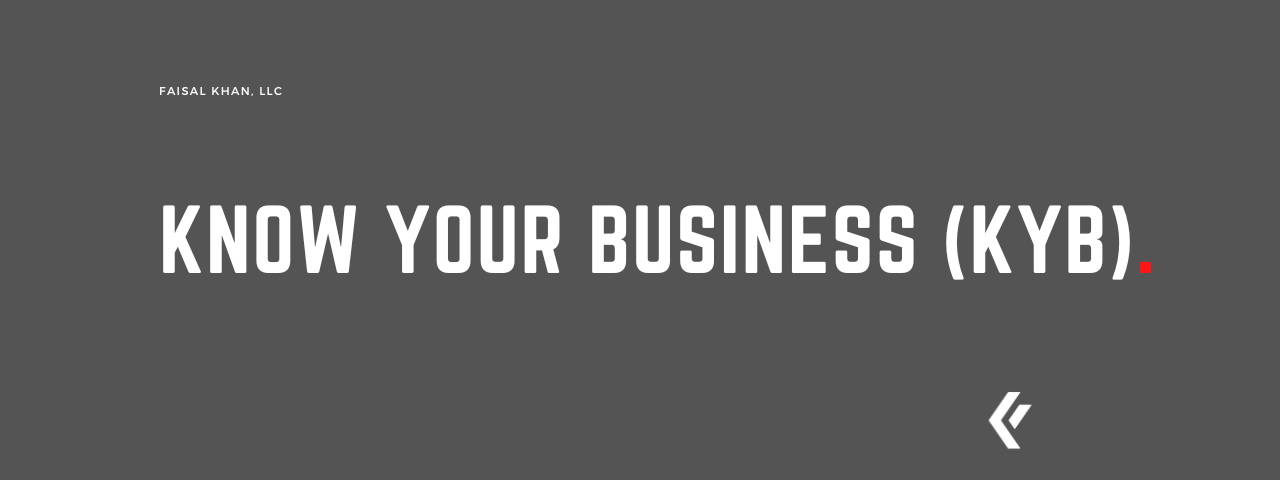Know Your Business (KYB) is a compliance process that is used to verify the identity and legitimacy of a business or organization. It is similar to Know Your Customer (KYC) in that it is used to prevent money laundering, terrorist financing, and other financial crimes by gathering information about a business and its owners or directors.
KYB is typically used to verify information about a business’s ownership, management, and operations. This can include information such as the names and addresses of the business’s owners or directors, the business’s registration documents, and information about the business’s operations, such as its revenue and the types of products or services it provides.
Documents that may be looked at during the KYB process include:
- Business registration certificates or licenses
- Business bank statements
- Business tax records
- Business plans or financial projections
- Articles of incorporation or other organizational documents
- Identify documents of the owners and directors
KYB is different from KYC in that it focuses on the business or organization rather than the individual customer. However, the two processes often overlap and complement each other, as the information gathered through KYB can be used to verify the identities of the individuals associated with a business.
KYB is also important in detecting and preventing illicit activities such as money laundering, terrorist financing and other financial crimes by detecting high-risk entities and transactions, and understanding the nature of the business and its beneficial ownership which is beneficial to the integrity of the financial system.
KYB is an ongoing process, it is not a one-time event and it is necessary to conduct ongoing due diligence on customers and business partners to ensure they remain compliant with relevant regulations.
The frequency at which Know Your Business (KYB) is conducted on an existing business can vary depending on the specific regulations and guidelines of the country or region where the business is located, as well as the risk profile of the business.
Some regulatory bodies may require KYB to be conducted annually, while others may require it to be done more frequently, such as semi-annually or even monthly. The higher risk a business is considered to be, the more frequently the KYB process may need to be conducted.
KYB is also an ongoing process, it is not a one-time event and it is necessary to conduct ongoing due diligence on customers and business partners to ensure they remain compliant with relevant regulations. This means that even if a business has undergone a KYB process, it is important to continue monitoring the business and its operations for any changes that may affect its compliance status.
For example, if a business expands its operations, changes its ownership structure, or begins to offer new products or services, it may be necessary to conduct additional KYB to ensure that the business continues to comply with relevant regulations.
In any case, it is important for virtual currency businesses to stay informed of the specific regulations and guidelines that apply to them in order to ensure that they are conducting KYB at the appropriate frequency and in compliance with relevant laws and regulations.
There are no specific certifications or qualifications that are required to conduct Know Your Business (KYB) compliance checks. However, businesses that are required to conduct KYB may need to have employees or contractors with specific skills and knowledge to perform the process effectively.
Regulatory bodies may require that employees who conduct KYB have a certain level of experience or education in compliance, anti-money laundering (AML), or counter-terrorism financing (CTF) regulations. They may also require that employees have a certain level of experience or education in the specific industry that the business operates in.
For example, businesses that operate in the virtual currency industry may be required to have employees with knowledge of virtual currencies and the regulations that apply to them. Similarly, businesses that operate in the financial services industry may be required to have employees with knowledge of financial regulations and compliance.
It is important for businesses to stay informed of the specific regulations and guidelines that apply to them in order to ensure that they are conducting KYB with the appropriate level of knowledge and skill. This can be achieved through on-going training of employees, hiring employees who have relevant experience and qualifications, or outsourcing to compliance experts.
As a part of this, businesses may also be required to have a compliance officer who is responsible for ensuring that the business is in compliance with relevant laws and regulations. This can be an individual or a team within the organization with the knowledge, training, and experience to understand and implement compliance policies and procedures.
Contact us!
—
This page was last updated on February 12, 2023.
–

